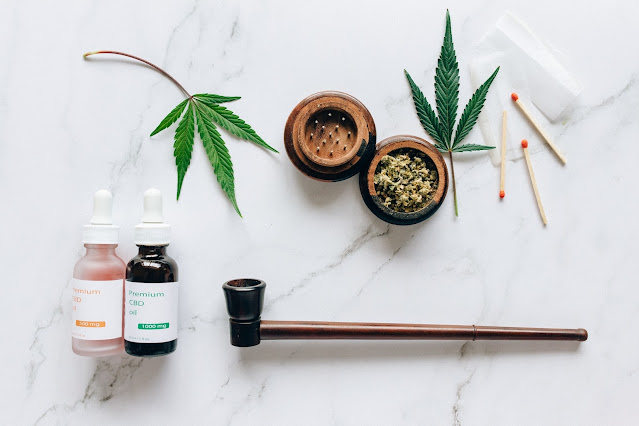CBD and THC, which are cannabinoids found in the cannabis indica plant are two of the most well-known and well-studied compounds found in this plant. While they have some similarities, they also have some distinct differences that impact how they affect the body and mind. Many people have heard of these two compounds, but not everyone understands the difference between them. In this post, we will look at the differences between CBD and THC in terms of their chemical structure, effects on the body, legal status, and more. By the end of this post, you will have a better understanding of these two compounds and how they differ from each other.
Chemical Structure
CBD and THC have similar chemical structures, but they differ in how their atoms are arranged. CBD has a slightly different arrangement of atoms than THC, which is why they have different effects on the body.
THC has a psychoactive effect on the body because it binds to the CB1 receptors in the brain, which are responsible for regulating mood, appetite, and other functions. CBD, on the other hand, does not bind to these receptors, so it does not have a psychoactive effect.
Effects on the Body
One of the biggest differences between CBD and THC is their effects on the body. THC is known for its psychoactive effects, which can include feelings of euphoria, relaxation, and altered perception of time and space. It can also cause side effects such as dry mouth, red eyes, and increased heart rate.
CBD, on the other hand, does not have a psychoactive effect on the body. Instead, it is known for its potential therapeutic benefits, such as reducing anxiety, inflammation, and pain. It can also help with conditions such as epilepsy, multiple sclerosis Parkinson's disease.
Both THC and CBD interact with the body's endocannabinoid system, which is responsible for regulating various functions such as mood, appetite, and sleep. However, they interact with different receptors in this system, which is why they have different effects on the body.
READ MORE: Cannabis Sativa Strains: Which Ones are Best for Your Needs?
Medical Uses
THC and CBD have different medical uses, and they are often used to treat different conditions. THC is used to treat conditions such as nausea, vomiting, and appetite loss in cancer patients. It is also used to treat pain, muscle spasms, and glaucoma.
CBD the other hand, is used to treat conditions such as epilepsy, anxiety, and inflammation. It is also used to treat conditions such as multiple sclerosis, Parkinson's disease, and Crohn's disease.
Both THC and CBD have potential therapeutic benefits, and more research is being done to explore their uses in treating various conditions.
Side Effects
THC and CBD can both cause side effects, but they differ in the types of side effects they can cause. THC can cause side effects such as dry mouth, red eyes, increased heart rate, and impaired coordination.
CBD, on the other hand, has fewer side effects than THC. Some people may experience side effects such as nausea, fatigue, or irritability, but these are generally mild and go away quickly.
It's important to note that the side effects of THC and CBD can vary depending on the dose, method of consumption, and individual factors such as age, weight, and tolerance.
Legal Status
THC and CBD have different legal statuses, and this is an important factor to consider when using these compounds. THC is classified as a Schedule 1 drug by the DEA, which means it is illegal under federal law. CBD, on the other hand, is legal in many states and countries as long as it contains less than 0.3% THC. However, it's important to check the laws in your state or country before using CBD, as the legal status can vary depending on where you live.
READ MORE: Discover the Ultimate Ranking of 10 Cannabis Strains You Can't Afford to Miss in 2023!
Methods of Consumption
THC and CBD can be consumed in different ways and the method of consumption can impact their effects on the body. THC is commonly by smoking or vaping, but it can also be consumed through edibles, tinctures, and oils.
CBD is also commonly consumed through edibles, tinctures, oils topical creams. The method of consumption can impact how quickly the effects are felt and how long they last.
Dosage and Tolerance
The dosage and tolerance of THC and CBD can vary depending on the individual. Some people may be more sensitive to these compounds, while others may require higher doses to feel the effects.
It's important to start with a low dose and gradually increase it as needed. It's also important to be aware of your tolerance and adjust your dosage accordingly.
Conclusion
CBD and THC are two of the most well-known compounds found in Cannabis Indica. While they have some similarities, they also have some distinct differences that impact how they affect the body and mind. THC is known for its psychoactive effects, while CBD is known for its potential therapeutic benefits. THC is classified as a Schedule 1 drug by the DEA, while CBD is legal in many states and countries as long as it contains less than 0.3% THC. It's important to be aware differences between these two compounds when using Cannabis Indica. By understanding the differences between CBD and THC, you can make informed decisions about how these compounds.
Further Research
If you're interested in learning more about CBD and THC, there are reputable sources for information including medical journals, government websites like XFactor Marijuana and cannabis advocacy groups.
It's important to do your own research and make informed decisions about using these compounds. By staying informed, you can make the best choices for your health and well-being.
>>> SAVE 10% on weed t shirt, womens cannabis clothing, stoner sweatpants, cannabis shoes, rastafarian clothes 420 outfit by CLICKING HERE.

Comments
Post a Comment